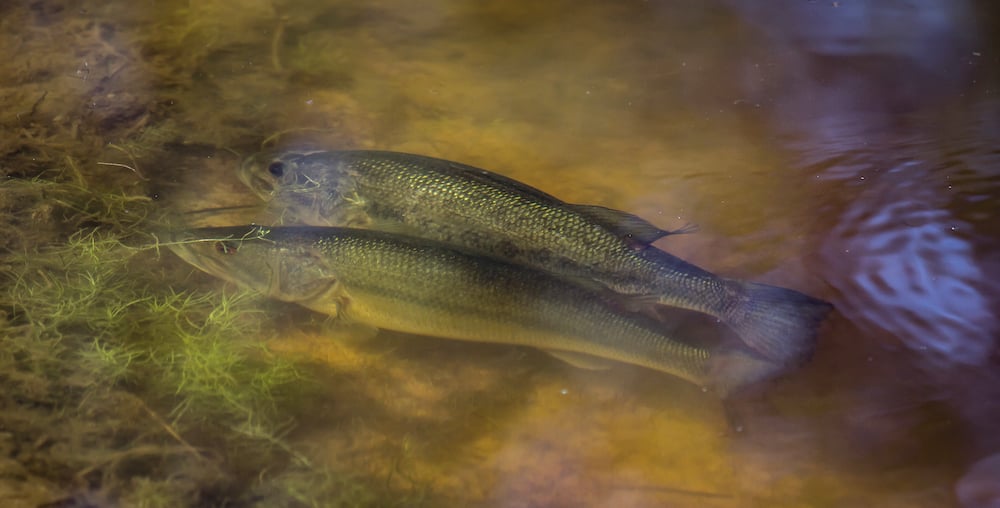We always get excited talking about raising trophy-class Bass, but when it comes to small ponds or lakes, that excitement is tempered with right-sized expectations.
It is possible to raise some very nice fish in smaller bodies of water, but unfortunately, when it comes to monster Bass production, pond size matters.
A lot.
Can I Grow Big Bass in a Little Pond?
It is possible to grow a 10-pound fish in a 1-acre pond.
However, it is pretty darn unlikely, and it requires an enormous amount of pond and fish management that most people just don't consider practical.
But, then again, this begs the question, what qualifies as a “Big Bass?”
The answer is often dependent upon who you ask. To me, a big Bass weighs at least seven pounds, but to some people, a three to five-pound Bass is a big deal. Thus, if your idea of a BIG bass falls around 3 pounds, you have better odds of reaching your goal. But if big lands in the 5+ category, then you need to prepare for the challenge ahead.
Despite how you define "Big Bass," to get the best quality Bass from a small body of water, there are three things you must do.
3 Must Do’s for Growing Big Bass in a Little Pond
- Supplementally stock forage species at the appropriate rates
- Implement an annual harvest strategy to reduce competition
- Ensure sufficient amounts of dissolved oxygen at all times
When managing Bass within a small body of water, it is important to remember the expectations associated with small lakes and ponds.
Small bodies of water are much more difficult to grow big Bass for many reasons, however small populations and increased variability of water quality are two of the primary concerns when dealing with a small pond environment.
A Small Pond Means a Small Gene Pool
Small ponds exhibit lower carrying capacity and are naturally able to support a finite number of individuals within any population.
Within a small population of individuals the odds that a fish with the correct genetic composition and efficiency as a predator is present is significantly reduced when compared to ponds or lakes of large size with much greater carrying capacities.
These smaller fisheries are also more susceptible to overabundance within a population and increased intraspecific competition that would negatively affect the growth of an individual even with the desired genetic composition.
Harvesting is a Must for Proper Pond Management
To limit intraspecific competition and ensure suitable forage availability, you must follow a strict annual harvest regiment.
Harvesting ten pounds of Bass in the less than 14-inch size class will reduce the density of these smaller, more aggressive Bass, resulting in greater forage availability for larger individuals.
Consider How Many Bass to Stock in Your Pond
Proper stocking density is also an important step when trying to grow big Bass in a smaller pond or lake.
Typical stocking rates consist of approximately 80 six to eight-inch Bass per acre.
The fisheries biologists at Pond King have observed that stocking fewer Bass of this size increases growth rates for smaller ponds.
Fewer Bass means less competition. Less competition means increased forage availability. Less competition plus increased forage availability means fatter Bass.
So, if your goal is to grow big Bass in your small pond, consider only stocking 40 Bass per acre. This strategy will also help reduce the likelihood of overpopulation.
Environmental Factors Have a Bigger Impact on Bass Growth Rates
The next challenge within small bodies of water is the variation of water quality throughout the year.
Smaller lakes and ponds tend to be shallower and shallow ponds are subjected to higher temperatures and more rapid temperature swings.
Hot shallow water contains a lower oxygen concentration than cooler water, often found near the metalimnion in larger bodies of water. Increased temperatures and lower oxygen concentrations are environmental stressors that will lower your Bass' metabolism and growth rates.
To limit these effects within a small pond, consider adding aeration devices that will improve the conditions through the summer months.
Speak to a Fisheries Biologist about Small Pond Management
If you want to get the most out of your small pond or lake but need some help, contact us anytime or call to ask a pro how to better manage your lake! We'll help you figure it out.
Or, if you're more of a DIY kinda guy, you can visit our interactive Pond Management Planning Guide for more information.
See y'all down at the pond.




